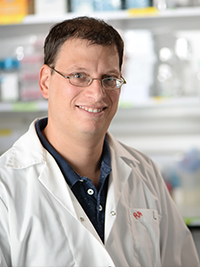
Assistant Professor
Department of Immunology and Cancer Research
The Hebrew University of Jerusalem
Jerusalem, Israel
Exploring the function of regulatory T cell sub-types in pancreatic cancer development and target regulatory T cells to mount an immune response.
Overview
Aim: Therapy
Pancreatic ductal adenocarcinoma (PDAC) is an extremely lethal cancer, having the lowest survival rate among all cancer types. One of the main reasons for the poor prognosis lies in the ineffectiveness of current treatments, including immunotherapy which is not beneficial for most patients. Immunotherapy attempts to induce an immune response against PDAC mostly rely on directly improving the cytotoxic activity of CD8 T cells but the immunosuppressive tumor microenvironment (TME) inhibits an efficient mounting of immune response. One of the cell types that participate in generating suppressive signals is regulatory CD4 T cells (Tregs). These immune cells attract to the pancreas at an early pre-malignant stage and accumulate during tumor progression. In recent publication and preliminary experiments, we have found that lesion and tumor-infiltrated Tregs includes at least two sub-populations and that the possibility of different function for each sub-type was not considered in previous studies. In the current proposal we aim to: (i) Investigate the effect of each Treg sub-type on tumor development and tumor mass. (ii) Screen for combinations of targeted genes that control Treg program and can be perturbed to convert Treg function from pro-cancerous to anti-cancerous.
We will build on the genetic and genomic tools that we generated, our extensive experience in working with PDAC models, and the solid preliminary data that we generated. We expect to achieve a better understanding of immunosuppressive TME and suggest new treatments either by adoptively transferring modified Tregs or by using drugs to restrict specific protein function according to the genetic screens and in vivo functional experiments.